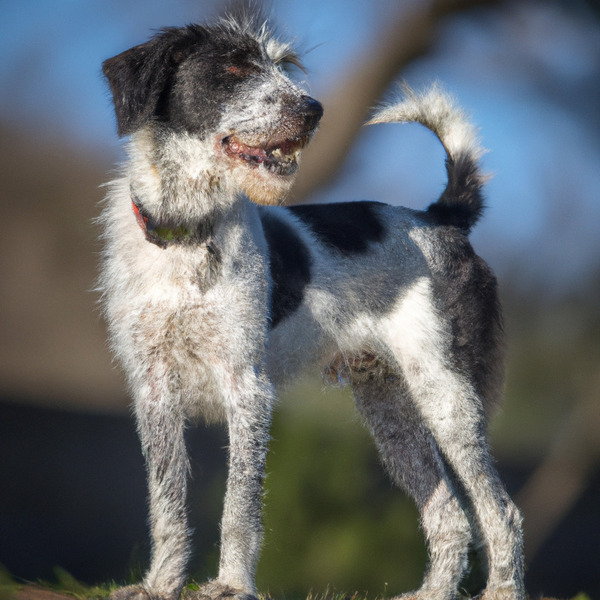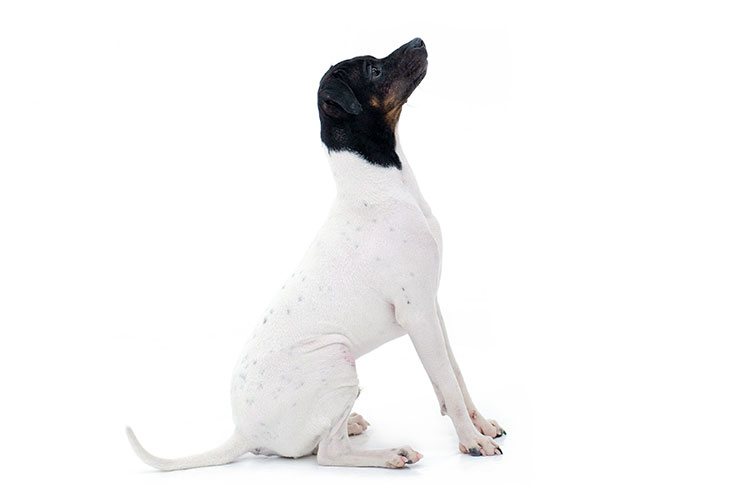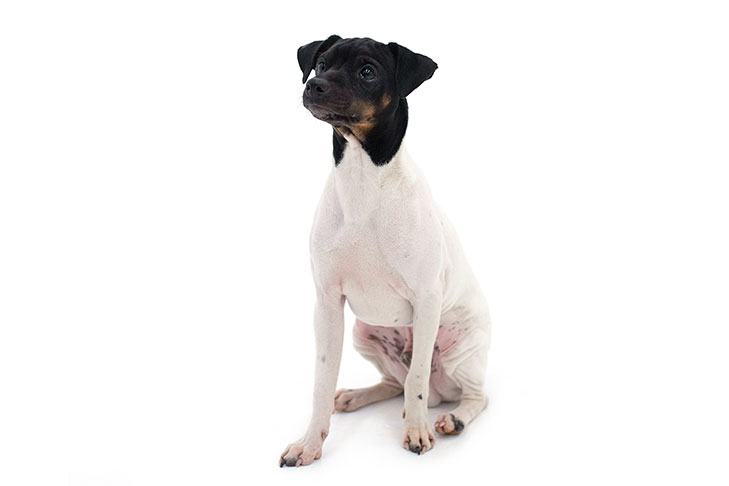Japanese Terrier
also known as Mikado Terrier, Kobe Terrier, Oyuki (Snowy) Terrier, Nihon Terrier, Nihon Teria, Nippon Terrier

 Summary
Summary
The Japanese Terrier is a small breed of dog that is native to Japan. It has a small and slender build, with a short, smooth coat that is typically black and tan in color. Japanese Terriers have a triangular head, large, alert eyes, and pointed ears. They are known for their intelligence and trainability, and they are often used as watchdog and companion dogs. Japanese Terriers are energetic and require regular exercise and mental stimulation to stay happy and healthy. They are loyal and affectionate with their families, and they make excellent companion dogs.
Breed Information
Is Japanese Terrier a purebred?
Purebred
How do you pronounce the Japanese Terrier name? How do you say Japanese Terriers?
jap-uh-neez ter-ee-er
What were Japanese Terriers originally used for?
Companion
How Long Do Japanese Terriers Live? What is average life expectancy for a Japanese Terrier? How long can Japanese Terriers live?
12-15 years
The average Japanese Terrier lifespan is somewhere between 12-15 years, provided they aren't beset by any exceptional health issues or injuries.
Japanese Terrier Height & Weight
How big is a full grown Japanese Terrier?

| Height | ||||
|---|---|---|---|---|
| Average | 6 months | 12 months | 18 months | |
| Male | 8-13 inches (20.3 - 33 cm) | 8.0 inches (20.3 cm) | 9.5 inches (24.1 cm) | 10.5 inches (26.7 cm) |
| Female | 8-13 inches (20.3 - 33 cm) | 8.0 inches (20.3 cm) | 9.5 inches (24.1 cm) | 10.5 inches (26.7 cm) |
| Weight | ||||
|---|---|---|---|---|
| Average | 6 months | 12 months | 18 months | |
| Male | 5-9 pounds (2 - 4 kg) | 4.5 pounds (2 kg) | 6.0 pounds (3 kg) | 7.0 pounds (3 kg) |
| Female | 5-9 pounds (2 - 4 kg) | 4.5 pounds (2 kg) | 6.0 pounds (3 kg) | 7.0 pounds (3 kg) |
Do Japanese Terriers get fat easily?
![]()
![]()
![]()
![]()
![]()
The Japanese Terrier is a dog breed that has a low risk for obesity. This means that they are less prone to gain weight than many other breeds, but it is still important to monitor their food intake and ensure they get enough exercise to maintain a healthy weight and overall well-being.
Are Japanese Terriers Hypoallergenic?
No
Unfortunately, the Japanese Terrier is not hypoallergenic, making it not a good choice for a dog lover who suffers from pet allergies.
What is a Japanese Terrier personality? What are Japanese Terrier dogs best known for?
Active
Cheerful
Swift
Affectionate
Lively
Vigilant
Are Japanese Terriers heavy shedders? How Much Does a Japanese Terrier Shed?
![]()
![]()
![]()
![]()
![]()
Japanese Terrier dogs are not heavy shedders, but they will lose a significant amount of hair each year. To decrease the amount of shedding, you can regularly brush your Japanese Terrier. This will remove loose hair and keep his coat growing in the same direction.
What is the watchdog ability of a Japanese Terrier dog?
![]()
![]()
![]()
![]()
![]()
Japanese Terriers are very good watchdogs. They are a vocal breed, and are wary of outsiders, so if someone approaches your home or aims to intrude, the Japanese Terrier is going to make sure everyone knows about it.
Breed History
Where do Japanese Terriers come from?
Japan
What are Japanese Terriers descended from?
Smooth Fox Terrier, German Pinscher, Kobe Terrier
What organizations or kennel clubs recognize/register the Japanese Terrier breed?
ACA = American Canine Association Inc.
DRA = Dog Registry of America, Inc.
When were Japanese Terriers first bred? How old is the Japanese Terrier breed?
1600s
What Breed Group is a Japanese Terrier?
Terrier

Japanese Terrier Appearance
What color are Japanese Terrier eyes?
Brown
What color can Japanese Terrier nose be naturally?
Black
What color can Japanese Terrier coat be naturally?
White
Black
Pied
How long is a Japanese Terriers coat?
![]()
![]()
![]()
![]()
![]()
The coat of a Japanese Terrier dog ranges in length from short to medium.
How Dense Is The Japanese Terrier Coat?
![]()
![]()
![]()
![]()
![]()
What is the texture of the hair of a Japanese Terrier?
Straight
How many puppies can a Japanese Terrier have in a litter? How many puppies can a Japanese Terrier have in her first litter?
12-15 puppies per pregnancy
A Japanese Terrier can have a litter of 12-15 puppies on average. However, it's worth noting that the size of the litters can vary greatly. Factors that can influence litter size include the health of the mother, breeding history, and genetics.
![]()
![]()
![]()
![]()
![]()
The adaptability of Japanese Terrier dogs is a well-known trait, they are known for being able to adjust well to different living environments and lifestyle changes.

Japanese Terrier Health Issues
Do Japanese Terriers have a lot of health problems?
![]()
![]()
![]()
![]()
![]()
The Japanese Terrier breed is commonly healthy with low vet costs, regular check-ups may not be as necessary but it's important to keep an eye on their health and have them checked by a veterinarian when needed.
What are the major health concerns to be aware of when owning a Japanese Terrier?
Usually A Very Healthy Breed
What are the less significant issues to keep in mind when it comes to Japanese Terriers?
Ear Infections
Patellar Luxation
Eye Problems
None Known
What are the occasional tests recommended for Japanese Terrier breed?
X-Rays
Eye Examination
Yearly Eye Exam
Yearly Physical Examination

Japanese Terrier Needs and Activities
Do Japanese Terriers have a lot of energy?
![]()
![]()
![]()
![]()
![]()
Japanese Terriers are high-energy dogs, thus an active lifestyle suits them well.
Do Japanese Terriers need socialization? How social are Japanese Terriers?
![]()
![]()
![]()
![]()
![]()
Japanese Terrier have above average social needs compared to other breeds.They thrive in environments where they have a lot of interaction with humans and other dogs.
How much exercise should Japanese Terriers get?
![]()
![]()
![]()
![]()
![]()
The Japanese Terrier needs a high level of physical activity to maintain a healthy lifestyle. They also make great companions for people who lead an active lifestyle and enjoy running, hiking or other outdoor activities. These breeds are not suitable for people with sedentary lifestyle or those who live in small apartments
How much sleep should a Japanese Terrier have? Do Japanese Terriers sleep a lot?
![]()
![]()
![]()
![]()
![]()
Japanese Terriers are active dogs that don't require as much sleep as other breeds. However, they still need enough sleep to stay healthy.
Does a Japanese Terrier drool a lot?
![]()
![]()
![]()
![]()
![]()
The Japanese Terrier is a dog that is known for its low drooling tendency. If you dislike drool marks on your clothing, the Japanese Terrier could be a suitable choice for you.
How much does it bark?
![]()
![]()
![]()
![]()
![]()
The Japanese Terrier is a vocal breed, with a tendency to bark and howl frequently. They may not be the best fit for those seeking a quiet companion. Their barks can vary and can indicate different emotions and needs.
Do Japanese Terriers exhibit aggressive behavior to safeguard their home and territory? Do they possess a natural tendency to guard?
![]()
![]()
![]()
![]()
![]()
These dogs are known for their strong territorial instinct and protective nature. They will fiercely defend their territory and are highly alert and vigilant against any perceived threat to their home and family.
Are Japanese Terriers mouthy?
![]()
![]()
![]()
![]()
![]()
What is the likelihood of a Japanese Terrier running away? Do they have a tendency to explore or wander frequently?
![]()
![]()
![]()
![]()
![]()
Do Japanese Terrier dogs have a high prey drive?
![]()
![]()
![]()
![]()
![]()
What do Japanese Terriers enjoy doing? How do I keep my Japanese Terrier busy?
Run playin
What is the energy level of a Japanese Terrier? How much energy does a Japanese Terrier have?
High
Japanese Terriers are high-energy dogs. They need mental as well as physical exercise. These dogs require a lot of your involvement and without it they can, and will, become problematic dogs.
![]()
![]()
![]()
![]()
![]()
How far should a Japanese Terrier walk each week? How many miles should a Japanese Terrier walk every week?
8 miles / week
There's really no limit to how far you walk your dog as long as they're comfortable. For Japanese Terrier, it's at least 8 miles / week. Just remember to build distance and stamina gradually over time.
How much a Japanese Terrier should exercise a day? How much activity does a Japanese Terrier need?
30 minutes
In general most Japanese Terriers usually need at least 30 minutes of exercise daily. This can be spread across the day and include all sorts of high-energy activities, like walking, running and playing.
What level of grooming should be provided for a Japanese Terrier?
![]()
![]()
![]()
![]()
![]()
The Japanese Terrier is a breed of dog that does not require extensive grooming.
How often should you brush a Japanese Terrier?
Weekly
Japanese Terrier should be brushed at least once a week. Of course you can give them more frequent brushes if you find that they are still shedding a lot
What are the most commonly used brushing tools for Japanese Terriers?
Slicker Brush
Nail Clipper
Costs
How many cups of food does a Japanese Terrier eat?
1 cups
For an average 5-9 pound (2 - 4 kg) Japanese Terrier feed 1 cups daily. But, keep in mind, the amount you feed is going to be dependent on the quality of the food you are feeding.
How Much Does a Japanese Terrier Cost Daily?
$1.10 - $1.40 / day
The average cost of a Japanese Terrier is somewhere $1.10 - $1.40 per day.
How Much Does a Japanese Terrier Cost Per Month?
$28 - $42 / month
The average per month expenses of a Japanese Terrier is between $28 - $42. This makes an average of $336 - $504 per year. It will be on the higher side when the dog is still small because it will need more frequent visits to the vet, shots.
Japanese Terrier Characteristic
How intelligent is a Japanese Terrier?
![]()
![]()
![]()
![]()
![]()
The Japanese Terrier breed is considered very intelligent and easy to train.
How sensitive is a Japanese Terrier dog?
![]()
![]()
![]()
![]()
![]()
This dog breed is particularly attuned to its environment and the emotions of those around it. It can be easily overwhelmed by loud noises, new environments, and unfamiliar people or animals. This dog is best suited for individuals or families who are patient, gentle, and understanding of its sensitive nature. It may also benefit from a calm and stable home environment, with a consistent routine and plenty of positive reinforcement training.
Are Japanese Terrier dogs affectionate?
![]()
![]()
![]()
![]()
![]()
Do Japanese Terrier do well in apartments? Are Japanese Terriers good indoor dogs?
![]()
![]()
![]()
![]()
![]()
It's not recommended to keep the Japanese Terrier in an apartment, but this breed make good apartment dogs as long as they get to spend a good amount of time outside of the apartment. Japanese Terriers living in apartments will need plenty of physical exercise and stimulation throughout the day to remain happy and well-behaved.
Are Japanese Terriers good with kids? Are Japanese Terriers good around children?
![]()
![]()
![]()
![]()
![]()
Japanese Terriers are kid-friendly dogs. They are good with children and excellent dogs with children if they are socialized and trained at a young age.
Are Japanese Terriers good for elderly?
![]()
![]()
![]()
![]()
![]()
Are Japanese Terriers good with cats? How friendly Japanese Terriers are toward cats?
![]()
![]()
![]()
![]()
![]()
Japanese Terriers are an average cat friendly dog. They do well with cats, even more if raised together from puppyhood,
Do Japanese Terrier dogs get along with other dogs? Are Japanese Terriers OK with other dogs?
![]()
![]()
![]()
![]()
![]()
Japanese Terriers are friendly, active and loyal companions. They generally love to be around other dogs, making them a good family pet for some,
How do Japanese Terrier dogs interact with other pets? Are they considered pet-friendly?
![]()
![]()
![]()
![]()
![]()
Are Japanese Terriers friendly with strangers?
![]()
![]()
![]()
![]()
![]()
Japanese Terriers are friendly dogs and won't commonly bark at strangers. However, if you wish to change this, training them is easy. With their intelligence, teaching this breed to do anything is pretty simple.
Do Japanese Terriers like to play? Are Japanese Terriers playful?
![]()
![]()
![]()
![]()
![]()
Japanese Terriers are known to be highly playful dog. So if you're not up for all that, think about adopting a slightly older Japanese Terrier for a mellower experience.
Are Japanese Terrier easily trained?
![]()
![]()
![]()
![]()
![]()
Japanese Terrier dogs are known for their ease of training and ability to learn quickly, making them a popular choice for pet owners and trainers alike.
 Pros & Cons
Pros & Cons
Pros
- Loyal and affectionate
Japanese Terriers are known for their loyalty and affectionate nature towards their family. They are generally good with children and make good family pets. - Maintain a healthy weight
Obesity is a rare occurrence in Japanese Terriers. - Intelligent and trainable
Japanese Terriers are intelligent and generally easy to train, making them a good choice for people who want a dog that is obedient and responsive to commands. - Low maintenance
Japanese Terriers have a short, smooth coat that requires minimal grooming. They are also small in size, which means they do not require a lot of space to live in.
Cons
- Rare breed
Japanese Terriers are a rare breed, which means they may be difficult to find. - Not suitable for office environment
Japanese Terriers may find an office setting too stressful. - Not Hypoallergenic
Due to their non-hypoallergenic nature, Japanese Terriers may cause allergic reactions in some people. - Not Apartment Friendly
Japanese Terrier may not thrive in a home environment. - Health concerns
Like all breeds, Japanese Terriers are prone to certain health issues, such as Ear Infections, Patellar Luxation and Eye Problems, and skin allergies. It is important to work with a reputable breeder and get a health guarantee when purchasing a Japanese Terrier puppy. - Barking
A distinctive trait of this breed of dog is their loudness. - High energy
Japanese Terriers have a lot of energy and require regular exercise to stay healthy and happy. They need a lot of mental and physical stimulation to prevent boredom and destructive behavior. - Need for socialization
Japanese Terriers, like all breeds, need to be socialized from an early age to prevent them from becoming fearful or aggressive.
Compare Japanese Terrier with other dogs
- Japanese Terrier vs Belgian Tervuren
- Japanese Terrier vs Vizsla
- Japanese Terrier vs German Wirehaired Pointing Wolfhound
- Japanese Terrier vs Clumber Pei
- Japanese Terrier vs Saint Dane
- Japanese Terrier vs Brussels Griffon
- Japanese Terrier vs French Bull Dane
- Japanese Terrier vs Weimardale
- Japanese Terrier vs Alaskan Pit Bull
- Japanese Terrier vs Sheltie Inu